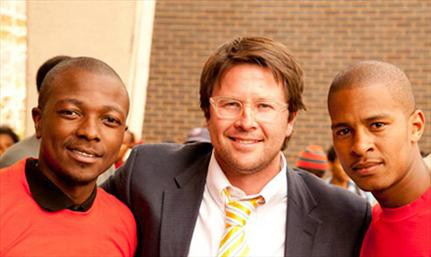|
 |
Rudi Buys, Dean of Student Affairs (centre), with newly elected president of the Bloemfontein Campus SRC, Phiwe Mathe (left) and Matlogelwa Moema, president of the Qwaqwa Campus SRC.
Photo: Sonia Small
29 August 2013 |
Phiwe Mathe and Matlogelwa Moema, both third year students, have been elected as presidents of the 2013/14 Student Representative Councils (SRC) of the University of the Free State’s Bloemfontein and Qwaqwa Campuses respectively. They now also serve as the presidency of the Central SRC and will take up their seats as voting members of the UFS council in September 2013. Thirty-eight candidates contested the 19 elective seats of the campus SRCs, for which 83 nominations were received.
Rudi Buys, Dean of Student Affairs, announced the completion of the elections at the two campuses as successful.Buys deemed the elections highly significant, considering it is the third year of peaceful elections since students adopted changes in student governance in 2011. These changes included, among others, the introduction of independent candidacy for elective portfolios and organisational candidacy in SRC sub-councils that hold ex-officio seats on the campus SRC. Changes also included the establishment of student representative seats in faculty forums and the adoption of reviewed SRC constitutions, Buys said.
The SRC elections at the Qwaqwa Campus were completed on 23 August 2013, while the elections at the Bloemfontein Campus took place on 26 and 27 August 2013. Elections at the Qwaqwa Campus showed a voter turnout of 44% and at the Bloemfontein Campus a turnout of 31.5%, which is among the highest in the country.
Both campuses reached the required quorums and the campus elections bodies, the IEA (Bloemfontein Campus) and IEC (Qwaqwa Campus), declared the elections free and fair and announced the results as a true reflection of the will of the student bodies at the campuses.
This year also saw the piloting of a central SRC elections oversight committee (CEC) to strengthen independent oversight of all elections. The CEC monitors the elections as free, fair and democratic and consists of senior academics and former student leaders of the Student Elders Council. Prof Loot Pretorius, inaugural chair of the CEC, announced the CECs confirmation of the SRC elections across campuses as free, fair and democratic.
Celebrations marked a mass meeting on the Bloemfontein Campus where the new student leaders were announced on Thursday 29 August 2013. There were cheers and singing as Quintin Koetaan, Head of the Bloemfontein IEA, on behalf of the two elections bodies, read the names of the newly-elected student leaders of both campuses. Delivering his victory speech, Phiwe thanked competitors for running a good debate, saying it was not about characters or personalities, but rather the ideas that would best serve a Kovsie. “Students will remain central and the ‘R’ is back in SRC,” he told the resounding crowd. Matlogelwa reiterated this message and said, "the SRC is for students and will serve all students equally."
Following on the heels of the SRC elections, voting for residence committees will take place next week with 618 candidates contesting 231 available positions. The elections of association executive committees will also take place in September.
The new SRC members of the Bloemfontein Campus are:
President: Phiwe Mathe
Vice-President: Tshepo Moloi
Secretary: Masiteng Paul Matlanyane
Treasurer: Willem du Plooy
Arts andCulture:Hlonipa Matshamba
Accessibility and Student Support:Anastasia Sehlabo
First Generation Students: Nthabiseng Malete
Legal and Constitutional Affairs: Mosa Leteane
Media, Marketing and Liaison: Callie Hendricks
Sport: Laurika Hugo
Student Development and Environmental Affairs: Bataung Qhotsokoane
Transformation: Christopher Rawson
Assosiations Council and Ex officio:Ntakuseni Razwiedani
Academics Affairs Council and Ex officio: TBC
Residence Council and Ex officio: Andricia Hinckermann
Commuter Council and Ex officio:Clarise Haasbroek
Postgraduate Council and Ex officio: Oluwatoba Fadeyi
International Council and Ex officio: Brian Hlongwane
Student Media Council and Ex officio: Keabetswe Magano
RAG Fundraising Council and Ex officio: Jaco Faul
Rag Service Council and Ex officio: Suzanne Maree
The new SRC members of the Qwaqwa Campu are:
President: MP Moema
Deputy-President: NT Mndebele
Secretary General: JC Mosiea
Treasurer General: NT Zuma
Politics and Transformation: IT Dube
Media and Publicity: ZF Madlala
Student Development and Environmental Affairs:SS Mtetwa
Off-Campus Students: TSJ Sithole
Arts and Culture: S Mabele
Academic Affairs: NE Litabo
Sport Affairs: TSG Mohlakoana
Religious Affairs:TW Mofokeng
Residence and Catering Affairs: A Ndabankulu
RAG Community Service and Dialogue: S Yende
Issued by: Lacea Loader
Director: Strategic Communication
Telephone: +27(0)51 401 2584
Cellphone: +27 (0) 83 645 2454
E-mail: loaderl@ufs.ac.za